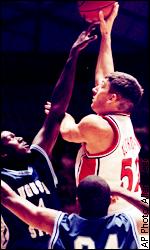| | By Jay Bilas
Special to ESPN.com
|
 |
|
|
Friday, Oct. 13
Hanno Mottola and Alex Jensen are gone, but this season's Utes may wind up being better than last season's version.
Rick Majerus might have lost four starters, but he has made Utah into a perennial contender that can absorb an annual loss of talent, especially with a talent infusion like this season. While Majerus says this team must find an
identity, his teams play like most NBA teams. Utah runs quality sets to
completion, defends to stop the toughest matchups and rebounds at both
ends.
Majerus-coached teams play big because they are big and play slow because they are slow. But he has proved that it can be an effective way to play -- and a pretty good identity.
Utah will have to sort out exactly who will shoulder the scoring and leadership load. Majerus will need to get
better production out of the point guard spot. But, you can be certain that this
team will be competitive with almost anyone.
|
|
|
Frontcourt
The keys to this team are Britton Johnsen and Chris Burgess.
Johnsen is perhaps Utah's best player, a McDonald's All-American who is returning from a Mormon mission. Majerus always joked about how Steve Young and Danny Ainge encouraged Johnsen to go on a mission, yet neither did it themselves. Johnsen has NBA potential and was the best player coming out of high school whom Majerus ever recruited to Utah.
Needless to say, the 6-foot-9 Johnsen has a tremendous upside. His agility makes him mobile, and he can really score. He has a good feel for putting the ball in the basket and understands the game. If Johnsen develops into a go-to guy for Majerus, Utah will be among the nation's elite.
Burgess is eligible after transferring from Duke and having some back problems. Burgess has worked on his 6-9 body and his game to enter the season more confident than he has been since leaving high school. A gifted and athletic big man who has good hands and feet, Burgess can run the floor, rebound and step away from the basket to shoot over smaller defenders.
Burgess lacked only confidence at Duke and really wants to be relied upon -- without having to look over his shoulder.
Nate Althoff is a 6-11 wide body who can be a presence inside. With some good physical tools, Althoff (9.5 ppg, 4.7 rpg, 61 percent FGs) has worked to be a reliable threat. Majerus will look
to Althoff to score more by getting good low-post position and finishing plays. He'll be expected to go to glass on every possession.
If Althoff can simplify his game and make rebounding and clogging the middle his priorities, he will be a major contributor. Althoff can shoot the ball, but he needs to be more reliable inside.
Phil Cullen is a good shooting big man who can step away from the basket but needs to be more consistent with his shot. Cullen is not a great athlete, but he's a hard-working team player. Mike Puzey is another 6-8
sophomore who can play minutes and provide rebounding. He has good hands
and plays hard.
Size also comes off the bench from 6-10 Lance Allred, 6-10 John Godfread and 7-0 Cameron Korford. Each will play some, but Majerus will be looking for them to simply play aggressive and physical minutes.
|  | | Nate Althoff is the man in the middle with plenty of offensive weapons around him this season. |
Backcourt
Junior college transfer Travis Spivey, the former Georgia Tech point guard, will run Utah's offense. Spivey
has a football build, is very strong and is good with the ball. He can push
the ball upcourt and finds people in transition.
Spivey played in high school with the Magic's Tracy McGrady and North Carolina's Max Owens. Spivey could have
played football at Miami (Fla.) instead of pursuing basketball. Spivey is far
more mature and confident since we last saw him at Georgia Tech and should
thrive under Majerus.
Kevin Bradley, another junior college player who went to Crenshaw High School in Los Angeles, is a very athletic player with a good shot. Redshirt freshman Nick Jacobsen was Minnesota's top player two
years ago and is a very good shooter. Because Jacobsen can shoot with range, he could start for Utah.
Jeff Johnsen (5.9 ppg, 3.7 rpg, 46 percent FGs) returned from his Mormon mission last season and performed well in a reserve role. Trace Caton was a reserve on the Utes' Final Four team in 1998. He's a very smart, strong player who can handle the ball and hit the open shot.
Caton is just returning from a mission. He will bring experience and the ability to be a good team defender. Caton is both physically and mentally tough, so he'll make smart plays. Freshman Marc Jackson is a strong-bodied shooter from the state of Utah and will round out the guards.
Majerus will have several capable and more athletic guards this season who will provide him with more scoring potential and more line-up options than he has had in the past two years.
Bottom Line
Majerus has a program. With Johnsen, Burgess and Spivey, Majerus will have the parts to put together a solid
team. If this team decides to defend as Majerus wants it to, then this could be another great year in Salt Lake City. | |
|



